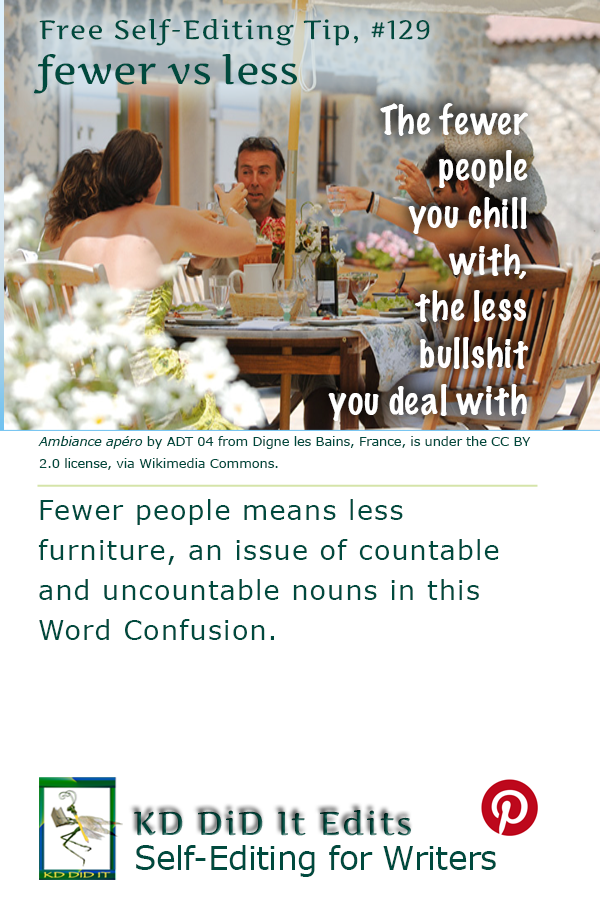Revised as of
4 Oct 2023
It’s a question of count versus mass. If you can count how many — vacuum cleaners, apples, werewolves, quilts, etc. — it’s a countable noun, which reliably indicates if there are fewer.
Looking at bolts of fabric at a fabric store, at bins of screws and nails at the hardware store, the clutter on top of your desk (and you can see if it’s less of a mess than usual, *grin*) — these are all mass (or uncountable) nouns.
Mignon Fogarty at Quick and Dirty Tips also notes that mass nouns aren’t plural, as in you wouldn’t say clutters, but clutter, furniture and not furnitures.
Word Confusions . . .
. . . started as my way of dealing with a professional frustration with properly spelled words that were out of context in manuscripts I was editing as well as books I was reviewing. It evolved into a sharing of information with y’all. I’m hoping you’ll share with us words that have been a bête noire for you from either end.
If you found this post on “Fewer versus Less” interesting, consider subscribing to KD Did It, if you’d like to track this post for future updates.
| Fewer | Less |
|---|---|

Cars at a URA Car Park is ProjectManhattan’s own work under the CC BY-SA 3.0 license, via Wikimedia Commons. Creag Leathen from Glen Feshie Car Park by Elliott Simpson is under the CC BY-SA 2.0 license, via Wikimedia Commons. — There are six fewer cars in the bottom parking lot. |

Chest Waxing by vanz is a derivative work by Beao under the CC BY-SA 2.0 license, via Wikimedia Commons. — Well, he does have less hair on the right. |
| Part of Grammar: | |
| Comparative form of few, which may itself be an adjective or a pronoun | Adjective; Adverb; Preposition; Pronoun; Suffix |
| Used with words denoting people or countable things | Used with mass nouns, denoting things that cannot be counted
Normally used with numbers and expressions of measurement or time |
| Adjective and Pronoun: [A few] A small number of Used to emphasize how small a number of people or things is |
Adjective: [Archaic] Of lower rank or importance Adverb: Not so much
Determiner: Not as much Preposition: Minus Pronoun: Not as much
Suffix: |
| Examples: | |
| Adjective: Grocery store signs should say: “Ten items or fewer”. Not “Ten items or If you’d ask fewer questions . . . He had fewer friends than Mabel. Ask which products have fewer complaints. Pronoun: Many believe it but only fewer are prepared to say. Fewer thought to challenge these assumptions. Fewer of the titles released these days have any literary merit. We have fewer members every year. There are fewer than ten cars left. Sadly, even fewer survived. |
Adjective: James the Less wasn’t much of a king. You should eat less meat. Adverb: That this is a positive stereotype makes it no less a stereotype. Mitch looked less than happy. The data was less than ideal. Less than two weeks before vacation! No matter how quickly we work, we seem to accomplish less. Determiner: Preposition: Pronoun: You’d better be ready in less than an hour. It’s a city with a population of less than 200,000. Suffix: It’s suggested that one eat chicken skinless. I was lost in the fathomless depths of the story. He was tireless in his attempt to reach the top. |
| Derivatives: | |
| Adjective, Determiner, Pronoun: few Noun: few Plural noun: the few |
Adverb: least |
| History of the Word: | |
| Old English fēawe and fēawa are from an Indo-European root shared by the Latin paucus and the Greek pauros meaning small. | Old English lǣssa, is of Germanic origin and related to the Old Frisian lēssa, from an Indo-European root shared by the Greek loisthos meaning last. |
C’mon, get it out of your system, bitch, whine, moan . . . which words are your pet peeves? Also, please note that I try to be as accurate as I can, but mistakes happen or I miss something. Email me if you find errors, so I can fix them . . . and we’ll all benefit!
Satisfy your curiosity about other Word Confusions on its homepage or more generally explore the index of self-editing posts. You may also want to explore Book Layout & Formatting Ideas, Formatting Tips, Grammar Explanations, Linguistics, Publishing Tips, the Properly Punctuated, Writing Ideas and Resources, and Working Your Website.
Resources for Fewer versus Less
Apple Dictionary.com
Fogarty, Mignon. “Less versus Fewer.” Quick and Dirty Tips.com. 30 Jan 2015. Accessed n.d. <https://www.quickanddirtytips.com/articles/less-versus-fewer/>. There are some nice examples and tips to tell the difference between countable nouns (fewer) and mass nouns (less).
Karen’s Linguistic Issues
Pinterest Photo Credits
Ambiance apéro by ADT 04 from Digne les Bains, France, is under the CC BY 2.0 license, via Wikimedia Commons.




My Mate and I often simultaneously shout “FEWER” every time a TV Reporter says “less” when “fewer” is the correct word
LOL, it’s terrifying to imagine all these “role models” out there perpetuating the wrong! Maybe we need more “shouting”…?
F-E-W-E-R !!!!
ROBLMAO!
You enjoyed shouting that, didn’t you …
Hee-heeee, yes I did!